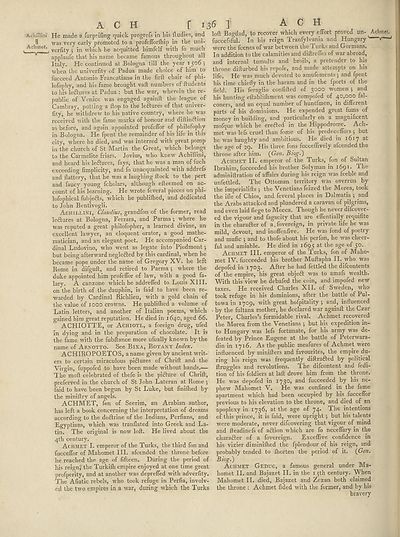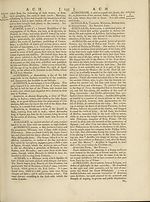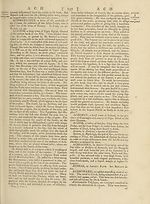Encyclopaedia Britannica, or, a Dictionary of arts, sciences, and miscellaneous literature : enlarged and improved. Illustrated with nearly six hundred engravings > Volume 1, A-AME
(154) Page 136
Download files
Complete book:
Individual page:
Thumbnail gallery: Grid view | List view

A C H [i
Aeliillini He made a furprifing quick progrefs in Ills fludies, and
A ^11 f was very early promoted to a profefforilup in the uni-
A C H
verfity j in which he acquitted himfelf with fo much
applaufe that his name became famous throughout all
Italy. He continued at Bologna till the year I 506 ;
when the univerfity of Padua made choice of him to
fucceed Antonio Francatiano in the firft chair of phi-
lofophy, and his fame brought vaft numbers of ftudents
to his le&ures at Padua : but the war, wherein the re¬
public of Venice was engaged againlt the league of
Cambray, putting a flop to the ledtures of that univer¬
fity, he withdrew to his native country, where he was
received with the fame marks of honour and diftindfion
as before, and again appointed profeffor of philofophy
in Bologna. He fpent the remainder of his life in this
city, where he died, and w'as interred with great pomp
in the church of St Martin the Great, which belongs
to the Carmelite friars. Jovius, who knew Achillini,
and heard his lediures, fays, that he was a man of fuch
exceeding fimplicity, and fo unacquainted with addrefs
and flattery, that he was a laughing flock to the pert
and faucy young fcholars, although efteemed on ac¬
count of his learning. He wrote ieveral pieces on phi-
lofophical fubjedls, which he publilhed, and dedicated
to John Bentivogli.
Achillini, Claudius, grandfon of the former, read
ledtures at Bologna, Ferrara, and Parma ; where he
was reputed a great philofopher, a learned divine, an
excellent lawyer, an eloquent orator, a good mathe¬
matician, and an elegant poet. He accompanied Car¬
dinal Ludovino, who went as legate into Piedmont j
but being afterward negledled by this cardinal, when he
became pope under the name of Gregory XV. he left
Rome in difguft, and retired to Parma •, where the
duke appointed him profeffor of law, with a good fa-
lary. A canzone which he addreffed to Louis XIII.
on the birth of the dauphin, is faid to have been re¬
warded by Cardinal Richlieu, with a gold chain of
the value of 1000 crowns. He publiflied a volume of
Latin letters, and another of Italian poems, which
gained him great reputation. He died in 1640, aged 66.
ACHIOTTE, or Achiotl, a foreign drug, ufed
in dying and in the preparation of chocolate. It is
the fame with the fubftance more ufually known by the
name of Arnotto. See Bixa, Botany Index.
ACHIROPOETOS, a name given by ancient writ¬
ers to certain miraculous piflures of Chrift and the
Virgin, fuppofed to have been made without hands.—
The moft celebrated of thefe is the pi&ure of Chrift,
preferved in the church of St John Lateran at Rome 5
faid to have been begun by St Luke, but finiftied by
the miniftry of angels.
ACHMET, fon of Seerim, an Arabian author,
has left a book concerning the interpretation of dreams
according to the do&rine of the Indians, Perfians, and
Egyptians, which was tranflated into Greek and La¬
tin. The original is now loft. He lived about the
4th century.
Achmet I. emperor of the Turks, the third fon and
fucceffor of Mahomet III. afcended the throne before
he reached the age of fifteen. During the period of
his reign, the Turkifh empire enjoyed at one time great
profperity, and at another was depreffed with adverfity.
The Afiatic rebels, who took refuge in Perfia, involv¬
ed the two empires in a war, during which the Turks
36 * ,
loft Bagdad, to recover which every effort proved un-
fuccefsful. In his reign Tranfylvania and Hungaryu
were the fcenes of W'ar between the Turks and Germans.
In addition to the calamities and diftreffes of war abroad,
and internal tumults and broils, a pretender to his
throne difturbed his repofe, and made attempts on his
life. He was much devoted to amufements; and fpent
his time chiefly in the haram and in the fports of the
field. His feraglio confifted of 3000 women •, and
his hunting eftabliftiment was compofed of 40,000 fal¬
coners, and an equal number of huntfmen, in different
parts of his dominions. He expended great fums of
money in building, and particularly on a magnificent
mofque which he erefted in the Hippodrome. Ach¬
met was leff cruel than fome of his predeceffors } but
he was haughty and ambitious. He died in 1617 at
the age of 29. His three fons fucceflively afcended the
throne after him. {Gen. Biogl)
Achmet II. emperor of the Turks, fon of Sultan
Ibrahim, fucceeded his brother Solyman in 1691. The
adminiftration of affairs during his reign was feeble and
unfettled. The Ottoman territory was overrun by
the imperialifts 5 the Venetians feized the Morea, took
the ifle of Chios, and feveral places in Dalmatia ; and
the Arabs attacked and plundered a caravan of pilgrims,
and even laid fiege to Mecca. Though he never difcoyer-
ed the vigour and fagacity that are effentially requifite
in the charafter of a.fovereign, in private life he was
mild, devout, and inoffenfive. He wras fond of poetry
and mufic ; and to thofe about his perfon, he was cheer¬
ful and amiable. He died in 1695 at the age of 50.
Achmet III. emperor of the Turks, fon of Maho¬
met IV. fucceeded his brother Muftapha II. who was
depofed in 1703. After he had fettled the difcontents
of the empire, his great objeft was to amafs wealth.
With this view he debafed the coin, and impofed new
taxes. He received Charles XII. of Sweden, 'who
took refuge in his dominions, after the battle of Pul-
towa in 1709, with great hofpitality 5 and, influenced
• by the fultana mother, he declared war againft the Czar
Peter, Charles’s formidable rival. Achmet recovered
the Merea from the Venetians ; but his expedition in¬
to Hungary wras lefs fortunate, for his army was de¬
feated by Prince Eugene at the battle of Peterwara-
din in 1716. As the public meafures of Achmet were
influenced by minifters and favourites, the empire du¬
ring his reign was frequently diftrafted by political
ftruggles and revolutions. The difcontent and fedi-
tion of his foldiers at laft drove him from the throne.
He was depofed in I73°» an^ fucceeded by his ne¬
phew Mahomet V. He was confined in the fame
apartment which had been occupied by his fucceffor
previous to his elevation to the throne, and died of an
apoplexy in 1736, at the age of 74. The intentions
of this prince, it is faid, were upright ; but his talents
were moderate, never difcovering that vigour of mind
and fteadinefs of aflion which are fo neceffary in the
charadler of a fovereign. Exceflive confidence in
his vizier diminilhed the fplendour of his reign, and
probably tended to fhorten the period of it. {Gen.
Biogl)
Achmet Geduc, a famous general under Ma¬
homet II. and Bajazet II. in the 15th century. When
Mahomet II. died, Bajazet and Zezan both claimed
the throne : Achmet fided with the former, and by his
bravery
Achmet.
Aeliillini He made a furprifing quick progrefs in Ills fludies, and
A ^11 f was very early promoted to a profefforilup in the uni-
A C H
verfity j in which he acquitted himfelf with fo much
applaufe that his name became famous throughout all
Italy. He continued at Bologna till the year I 506 ;
when the univerfity of Padua made choice of him to
fucceed Antonio Francatiano in the firft chair of phi-
lofophy, and his fame brought vaft numbers of ftudents
to his le&ures at Padua : but the war, wherein the re¬
public of Venice was engaged againlt the league of
Cambray, putting a flop to the ledtures of that univer¬
fity, he withdrew to his native country, where he was
received with the fame marks of honour and diftindfion
as before, and again appointed profeffor of philofophy
in Bologna. He fpent the remainder of his life in this
city, where he died, and w'as interred with great pomp
in the church of St Martin the Great, which belongs
to the Carmelite friars. Jovius, who knew Achillini,
and heard his lediures, fays, that he was a man of fuch
exceeding fimplicity, and fo unacquainted with addrefs
and flattery, that he was a laughing flock to the pert
and faucy young fcholars, although efteemed on ac¬
count of his learning. He wrote ieveral pieces on phi-
lofophical fubjedls, which he publilhed, and dedicated
to John Bentivogli.
Achillini, Claudius, grandfon of the former, read
ledtures at Bologna, Ferrara, and Parma ; where he
was reputed a great philofopher, a learned divine, an
excellent lawyer, an eloquent orator, a good mathe¬
matician, and an elegant poet. He accompanied Car¬
dinal Ludovino, who went as legate into Piedmont j
but being afterward negledled by this cardinal, when he
became pope under the name of Gregory XV. he left
Rome in difguft, and retired to Parma •, where the
duke appointed him profeffor of law, with a good fa-
lary. A canzone which he addreffed to Louis XIII.
on the birth of the dauphin, is faid to have been re¬
warded by Cardinal Richlieu, with a gold chain of
the value of 1000 crowns. He publiflied a volume of
Latin letters, and another of Italian poems, which
gained him great reputation. He died in 1640, aged 66.
ACHIOTTE, or Achiotl, a foreign drug, ufed
in dying and in the preparation of chocolate. It is
the fame with the fubftance more ufually known by the
name of Arnotto. See Bixa, Botany Index.
ACHIROPOETOS, a name given by ancient writ¬
ers to certain miraculous piflures of Chrift and the
Virgin, fuppofed to have been made without hands.—
The moft celebrated of thefe is the pi&ure of Chrift,
preferved in the church of St John Lateran at Rome 5
faid to have been begun by St Luke, but finiftied by
the miniftry of angels.
ACHMET, fon of Seerim, an Arabian author,
has left a book concerning the interpretation of dreams
according to the do&rine of the Indians, Perfians, and
Egyptians, which was tranflated into Greek and La¬
tin. The original is now loft. He lived about the
4th century.
Achmet I. emperor of the Turks, the third fon and
fucceffor of Mahomet III. afcended the throne before
he reached the age of fifteen. During the period of
his reign, the Turkifh empire enjoyed at one time great
profperity, and at another was depreffed with adverfity.
The Afiatic rebels, who took refuge in Perfia, involv¬
ed the two empires in a war, during which the Turks
36 * ,
loft Bagdad, to recover which every effort proved un-
fuccefsful. In his reign Tranfylvania and Hungaryu
were the fcenes of W'ar between the Turks and Germans.
In addition to the calamities and diftreffes of war abroad,
and internal tumults and broils, a pretender to his
throne difturbed his repofe, and made attempts on his
life. He was much devoted to amufements; and fpent
his time chiefly in the haram and in the fports of the
field. His feraglio confifted of 3000 women •, and
his hunting eftabliftiment was compofed of 40,000 fal¬
coners, and an equal number of huntfmen, in different
parts of his dominions. He expended great fums of
money in building, and particularly on a magnificent
mofque which he erefted in the Hippodrome. Ach¬
met was leff cruel than fome of his predeceffors } but
he was haughty and ambitious. He died in 1617 at
the age of 29. His three fons fucceflively afcended the
throne after him. {Gen. Biogl)
Achmet II. emperor of the Turks, fon of Sultan
Ibrahim, fucceeded his brother Solyman in 1691. The
adminiftration of affairs during his reign was feeble and
unfettled. The Ottoman territory was overrun by
the imperialifts 5 the Venetians feized the Morea, took
the ifle of Chios, and feveral places in Dalmatia ; and
the Arabs attacked and plundered a caravan of pilgrims,
and even laid fiege to Mecca. Though he never difcoyer-
ed the vigour and fagacity that are effentially requifite
in the charafter of a.fovereign, in private life he was
mild, devout, and inoffenfive. He wras fond of poetry
and mufic ; and to thofe about his perfon, he was cheer¬
ful and amiable. He died in 1695 at the age of 50.
Achmet III. emperor of the Turks, fon of Maho¬
met IV. fucceeded his brother Muftapha II. who was
depofed in 1703. After he had fettled the difcontents
of the empire, his great objeft was to amafs wealth.
With this view he debafed the coin, and impofed new
taxes. He received Charles XII. of Sweden, 'who
took refuge in his dominions, after the battle of Pul-
towa in 1709, with great hofpitality 5 and, influenced
• by the fultana mother, he declared war againft the Czar
Peter, Charles’s formidable rival. Achmet recovered
the Merea from the Venetians ; but his expedition in¬
to Hungary wras lefs fortunate, for his army was de¬
feated by Prince Eugene at the battle of Peterwara-
din in 1716. As the public meafures of Achmet were
influenced by minifters and favourites, the empire du¬
ring his reign was frequently diftrafted by political
ftruggles and revolutions. The difcontent and fedi-
tion of his foldiers at laft drove him from the throne.
He was depofed in I73°» an^ fucceeded by his ne¬
phew Mahomet V. He was confined in the fame
apartment which had been occupied by his fucceffor
previous to his elevation to the throne, and died of an
apoplexy in 1736, at the age of 74. The intentions
of this prince, it is faid, were upright ; but his talents
were moderate, never difcovering that vigour of mind
and fteadinefs of aflion which are fo neceffary in the
charadler of a fovereign. Exceflive confidence in
his vizier diminilhed the fplendour of his reign, and
probably tended to fhorten the period of it. {Gen.
Biogl)
Achmet Geduc, a famous general under Ma¬
homet II. and Bajazet II. in the 15th century. When
Mahomet II. died, Bajazet and Zezan both claimed
the throne : Achmet fided with the former, and by his
bravery
Achmet.
Set display mode to:
![]() Universal Viewer |
Universal Viewer | ![]() Mirador |
Large image | Transcription
Mirador |
Large image | Transcription
Images and transcriptions on this page, including medium image downloads, may be used under the Creative Commons Attribution 4.0 International Licence unless otherwise stated. ![]()
| Permanent URL | https://digital.nls.uk/193133987 |
|---|
| Attribution and copyright: |
|
|---|
| Description | Ten editions of 'Encyclopaedia Britannica', issued from 1768-1903, in 231 volumes. Originally issued in 100 weekly parts (3 volumes) between 1768 and 1771 by publishers: Colin Macfarquhar and Andrew Bell (Edinburgh); editor: William Smellie: engraver: Andrew Bell. Expanded editions in the 19th century featured more volumes and contributions from leading experts in their fields. Managed and published in Edinburgh up to the 9th edition (25 volumes, from 1875-1889); the 10th edition (1902-1903) re-issued the 9th edition, with 11 supplementary volumes. |
|---|---|
| Additional NLS resources: |
|

